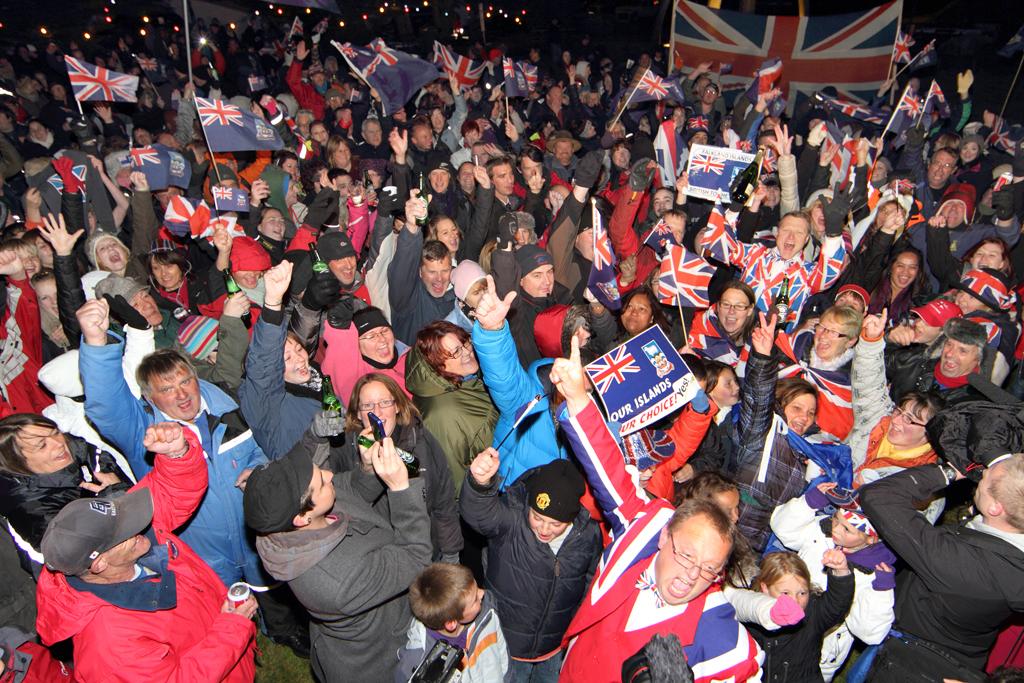The Falkland defectors
Residents of the Falkland Islands celebrate in the capital city of Port Stanley after the announcement of the referendum’s results on March 11, 2013. Almost all of the islanders voted to remain a British Overseas Territory, with three lone voices voting in favor of Argentina.
BUENOS AIRES, Argentina — British Prime Minister David Cameron claimed he was “delighted” with the results. Argentina’s President Cristina Fernandez de Kirchner, meanwhile, lambasted what she referred to as a vote by a “group of squatters.”
The outcome of this week’s Falkland Islands’ referendum had, of course, been widely viewed as one of the most predictable plebiscites in history. And it didn’t disappoint: 99.8 percent of the islanders voted to remain a British Overseas Territory. Three lone voices — for now anonymous — voted the other way.
But away from the media circus of the islands’ capital, Port Stanley, another islander was making his “no” stance known rather more publicly. Sixty-five-year-old Alexander Betts is now known as Alejandro. He lives in a small village in central Argentina, one of a tiny handful who abandoned the islands after the two-month war 30 years ago — a move most islanders see as a betrayal.
Alejandro has become a fervent supporter of Argentina’s territorial claim over the southern Atlantic outpost. Speaking on the phone, he calls the referendum result a “foregone conclusion,” adding that it was a “rather grotesque move from Great Britain to try and silence Argentina’s legitimate claim to the islands.”
The former Falklands resident is so accustomed to speaking Spanish these days — he’s re-married an Argentine, Carolina — that he occasionally gets his words muddled and has to finish sentences in his adopted language.
Alejandro was originally reluctant to do an interview, claiming that in the three decades since he left the Falkland Islands, his words have been all too often twisted by the English-language press.
He steers the conversation toward the Latin American country’s “strong” legal case, which he says he began to understand as far back as 1976. By 1981, it was clear in his mind that he wanted to move to the “mainland.” Back then, too, interaction between the two sides was far more fluid and Alejandro had been working for the Argentine civil service in its office in the islands’ capital, which he refers to as “Puerto Argentino.”
So does he not feel British at all?
“No, I never did,” he replies quickly, before pausing. “I was simply an islander until 1982 and now I am an Argentinian. Or rather, I was born Argentine but didn’t realize it until 1976 onwards.”
What Alejandro is less keen to talk about is his personal story. He left behind many friends and family. His son, Paul (now known as Pablo), was already studying in Argentina when his father left. But his daughter Dawn — 11 at the time — remained in the Falklands with the rest of the family.
Alejandro, an air traffic controller, says he now has little communication with his relatives living across the divide. He refers to himself as the “black sheep of the family” and says staying in touch is hard.
“Due to the rigidness that exists there, it's hard for my family to stay in contact with me and live side-by-side with the rest of the islanders,” he says.
A card-carrying Argentine, Alejandro isn’t the only Falklander to have moved to Argentina. He believes that since the 1982 war there have been “three or four” others.
James Peck, 44, is a talented artist renowned for evocative paintings of the windswept Falkland Islands landscapes of his youth. He moved to Argentina to be near a child he fathered with a local partner, now his ex. In 2011, President Fernandez de Kirchner granted him dual nationality in a much-hyped ceremony.
A gallery owner in Buenos Aires, where Peck’s work has been displayed, said he is reluctant to speak to the media about anything other than his art given the sensitivity of the subject. Peck declined an interview request.
Alejandro, although wary of how he might be construed, chuckled at the idea the Argentine government could be using him as a political pawn. He regularly appears at events for "las Malvinas” (the Argentine name for the islands) and has recorded a video for the country’s foreign office about the country’s claim.
“All that I do for the Argentina cause is done voluntarily,” he says, “as I’m totally convinced of the country’s claim to the islands. So it’s a civil obligation.”
He says the break-up of his family was a “minor issue taken at a private level,” dwarfed by far bigger issues at play regarding the islands’ status.
“They’re perfectly happy and willingly carrying out their lives on the islands,” he says of his family there. “And I’m perfectly happy [here].” He acknowledges that he’s simply become “accustomed” to the lack of relationship he has with daughter Dawn — they’ve been apart 30 years.
GlobalPost Commentary: Falklands/Malvinas war again used for petty politics
As images of jubilant, flag-waving islanders, one dressed in an Union Jack suit, were beamed around the world last weekend, Alejandro painted the picture of a closed society where thinking differently is frowned upon.
He calls the decision made by the three people who voted against British rule in the islands “extremely bold.”
“They will be discovered — it’s a small community and everyone knows everyone else,” he says. “Sooner or later it will leak out and there will be repercussions.”
If the leak happens, the number of Falkland Islands who have crossed the divide may well double overnight.
